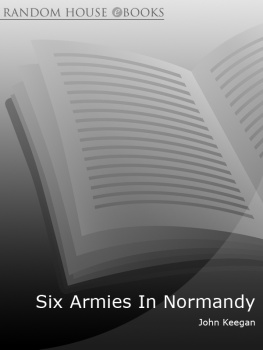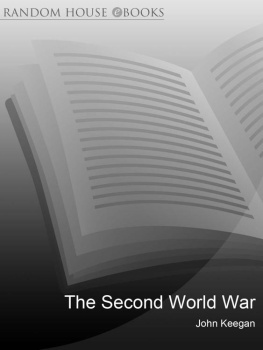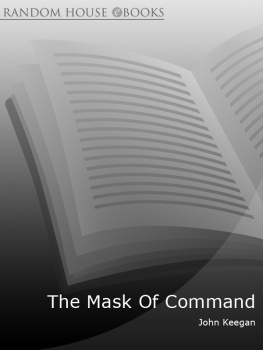How War Begins
from The First World War
John Keegan
A Vintage Short
Vintage Books
A Division of Random House LLC
New York
Copyright 1998 by John Keegan
All rights reserved. Published in the United States by Vintage Books, a division of Random House LLC, New York, a Penguin Random House company. How War Begins was previously published as part of The First World War, in the United States by Vintage Books, a division of Random House LLC, New York. Originally published in Great Britain by Hutchinson, an imprint of Random House UK Limited, London, in 1998, and subsequently published in hardcover in the United States by Alfred A. Knopf, a division of Random House LLC, New York, in 1999.
Vintage and colophon are registered trademarks of Random House LLC.
The Cataloging-in-Publication Data for The First World War is available from the Library of Congress.
Cover design by Joan Wong
Vintage eShort ISBN: 978-1-101-87363-2
www.vintagebooks.com
v3.1_r2
Contents

In June 1914 the honour of Austria-Hungary, most sensitive because weakest of European powers, was touched to the quick by the murder of the heir to the throne at the hands of an assassin who identified himself with the monarchys most subversive foreign neighbour. The Austro-Hungarian empire, a polity of five major religions and a dozen languages, survived in dread of ethnic subversion. The chief source of subversion was Serbia, an aggressive, backward and domestically violent Christian kingdom which had won its independence from the rule of the Muslim Ottoman empire after centuries of rebellion. Independent Serbia did not include all Serbs. Large minorities remained, by historical accident, Austrian subjects. Those who were nationalists resented rule by the Habsburgs almost as much as their free brothers had rule by the Ottomans. The most extreme among them were prepared to kill. It was the killing by one of them of the Habsburg heir that fomented the fatal crisis of the summer of 1914.
The Habsburg armys summer manoeuvres of 1914 were held in Bosnia, the former Ottoman Turkish province occupied by Austria in 1878 and annexed to the empire in 1908. Franz Ferdinand, nephew to the Emperor Franz Josef and Inspector General of the army, arrived in Bosnia on 25 June to supervise. After the manoeuvres concluded, on 27 June, he drove next morning with his wife to the provincial capital,
Investigation swiftly revealed that, though the terrorists were all Austrian subjects, they had been armed in Serbia and smuggled back across the Austrian border by a Serbian nationalist organisation. The Austrian investigators identified it as the Narodna Odbrana (National Defence), set up in 1908 to work against the incorporation of Bosnia into the Austrian empire; it was a tenet of the nationalist creed that Bosnia was historically Serb. In fact the responsible organisation was the clandestine Union or Death, commonly known as the Black Hand. The misapprehension was scarcely substantial, since the two shared members and the Narodna Odbrana in Bosnia lent help to the Black Hand.
The exact degree of foreknowledge of the plot attributable to the Serbian government has never been established; intelligence is a murky world, then as now, but then more commonly one peopled by uniformed officers, as the Dreyfus affair had sensationally revealed. Apis, properly Colonel Dragutin Dimitrijevic, was a revolutionary as well as a soldierhe had taken part in the brutal overthrow of the Obrenovic dynasty in 1903and may well have been living two lives. Whatever the truth, by 2 July three of the murder team had made a full confession; it disclosed that they had been supplied with weapons from a Serbian military arsenal and helped to cross the border by Serbian frontier guards. The information was sufficient to confirm Austrias rooted belief in Serbian malevolence and to arouse its equally ready desire to punish the small kingdom for its disturbance of order within the empire.
The Slav problem was the weightiest of the empires many difficulties with its minorities but, within those difficulties, the Serb problem constituted an active and growing threat. While the problem of the Poles was diffused by the partition of their ancient kingdom with Germany and Russia, the problem of the Czechs by the heavy Germanisation of their cities and the problem of the Croats by their Catholicism, nothing, it seemed, could diffuse that of the Serbs but the use of force. Their Orthodox Christianity made them a religious as well as national minority and one which Russias guardianship of the Orthodox Church made cocksure; their long years of guerrilla resistance to Turkish rule had rendered them headstrong and self-reliant but also, in Austrian eyes, devious and untrustworthy; their poverty kept them warlike. The small kingdom of Serbia was intensely warlike. It had won independence from the Ottomans by its own effort in 1813 and glory and territory in the Balkan Wars of 191213. National rebirth had raised the idea of a Greater Serbia, strong within the kingdom and a beacon to Austrias Serbs in Bosnia and Croatia. It had to be resisted, for not only were Serbs but one minority among others in those territories but neither could be surrendered. Strategy forbade it but so also did the imperial system itself, which was creakily sustained by the denial of the worth of nationality as a political idea. Concession to one nationality would soon entail concession to others and that way lay the dissolution of the empire itself.
The evidence of Serb complicity, official or not, in the assassination of Franz Ferdinand, exposed by the conspirators confessions of 2 July, was therefore enough to persuade many in the imperial government that a war against Serbia was now a necessity. As it happened, Count Berchtold, the Austro-Hungarian Foreign Minister, had spent much of Berchtold gave the emissary, Count Hoyos, verbal authority to warn the Germans that Vienna would ask Belgrade for guarantees as to its future conduct, to be followed by military action if refused. Within six days of the assassination, therefore, Austria had staked out her position. It remained to see whether the German Emperor and his government, without whose backing the Austrians dare not act, would support them.
Dare not Austria might; in retrospect it is tempting to surmise that, had she struck at once in anger, trumpeting dynastic wrath and righteous belief in Serbias guilt, Europe might have allowed her to mount positive measures without outside interference. Russia, a great Slav brother, had tender feelings towards the Serbs but feelings are different from vital interests and certainly no motive for war. The Bulgarians were Slavs also, and they had suffered defeat and humiliation in 1913 without Russia intervening to rescue them. The Serbs, moreover, were odd-man-out even in the wild Balkans, worse than that in the eyes of civilised Europe. The Asiatic behaviour of their armys officers in 1903, when they had not only killed their king and queen but then thrown the bodies from a window of the royal palace and hacked them limb from limb with their swords, had shocked sensibilities everywhere. Italy, which coveted the same Adriatic coastline towards which Greater Serbia aspired, would certainly not have impeded her Triple Alliance partner if she had punished Belgrade. France, though she had supplied Serbia with weapons, had no means of lending her further support, even had she wished to do so. Britain had no involvement in the Balkans whatsoever. Had Austria moved at once, therefore, without seeking Germanys endorsement, it is possible, perhaps probable, that the Serbs would have found themselves as isolated strategically as, initially, they were morally, and so forced to capitulate to the Austrian ultimatum. It was Austrias unwillingness to act unilaterally that transformed a local into a general European crisis and her unwillingness so to act must be explained in large part by the precautionary mood of thought which decades of contingent war planning had implanted in the mind of European governments.












